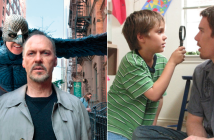
The Dam Keeper (Dir. Robert Kondo and Dice Tsutsumi)
Every year, for all the hand-wringing and second guessing that takes place among Oscar pool participants over the main categories, inevitably the picks that make or break one’s Oscar ballot are the picks for the three Short Film categories. Historically, the Oscar nominated shorts are the little films that are completely difficult to gauge in terms of broad Academy likability and are very often not seen by many outside of the Academy and the Oscar Pundit circuit. The availability factor has been helped in recent years by short theatrical and VOD runs for the short film collectives, but nevertheless, of the many below-the-line categories, the Shorts feel like the furthest below that line.
That is by no means a value judgment. This year and every year there are examples of beautiful, fascinating, compelling films in each of these three categories: Best Animated Short, Best Live Action Short, and Best Documentary Short. But in terms of perception, the short films are ever on the outside looking in.
BUT NOT ON MY WATCH!
Here to save the day, as always, is Projection: Oscar. Today we will dig in to all 15 of the nominated shorts, giving each film its due, both in terms of discussion and Oscar winning potential. But before we do that, I have to lay a little theory on y’all…you knew that was coming, right?
With the aforementioned knowledge that these shorts are treated as red-headed stepchildren by the entire Oscar sphere – from the average watcher to even the Academy itself (since endless streams of voter interviews inevitable reveal many of these voters abstain from voting in these categories) – there are two basic ways to win an Oscar Shorts category. The first is simple: be good. Since these tiny films are generally free of outside influence and season-long hysteria, quality has a true opportunity to win out. But there is that other, slightly more cynical path to Oscar gold for a short film: a sliver of notoriety. For the same reason cited above – these are small films with little-to-no exposure – any shred of recognition can engage a viewer and therefore allow the film to stand out. So, say you have a Live Action Short that features a famous actor, or an Animated Short produced by a high-powered entity like Disney (which, let’s face it, happens nearly every year)…those films can have an advantage purely on the strength of their visibility.
That notion will be revisited again and again as we dig into these categories…
BEST ANIMATED SHORT

The Bigger Picture (Dir. Daisy Jacobs and Christopher Hees)
The Bigger Picture is a gorgeously animated film from UK filmmakers Daisy Jacobs and Christopher Hees. Telling the increasingly depressing tale of two brothers as they care for their dying mother, Jacobs and Hees pit their traditionally painted characters against full size sets to create what is likely the most unique stylistic universe of the category. The narrative is more or less a swift dive into bad news territory, and even the beautiful animation functions as a heavy hanging cloud, but there is no denying the film’s innovative beauty.
The Dam Keeper is the true revelation of this category. Robert Kondo and Dice Tsutsumi create a storybook world that comes to vivid, rustic animated life, though once again the threat of peril hovers in the atmosphere. A young pig has inherited a vital job in his village: he controls the dam that filters out a dark and dangerous foreign substance. But while at school, he is viciously bullied by his peers. How this bullying impacts the sensitive pig, what it means for his grander responsibility, and the seismic effect of making his first friend are explored with incredible emotional depth in a positively gorgeous animated world. With any justice, this film wins the Oscar.
Feast is that token Disney entry I mentioned earlier. It originally played in front of Big Hero 6, and it’s probably the only nominee most people will easily recognize – it’s the movie about the dog and his craving for food. Of course, it’s not that simple. Feast is, as usual from the Disney animators, a lovely tale within a creative concept that somehow gets right to the heart of happiness and connectivity. And in terms of widespread notoriety, it could easily win the Oscar.
Me and My Moulton actually comes with Oscar pedigree – its director, Torill Kove, won in this category for The Danish Poet in 2007. There will not be a similar outcome this time around, as the film is well-animated and pleasant to watch but is essentially a moderately engaging coming-of-age story about three sisters and their wish for a bicycle. Simple but sweet, and a little long, even at 13 minutes.
A Single Life is a blast…even in less than two-and-a-half minutes. And it’s a tad morbid, too, in the most delicious way. In short (and for this movie, there is no other way), a woman is able to navigate back and forth through her life by skipping the needle on a record playing on her turntable. The charm and the pathos can’t be adequately explained – just seek this one out and experience it.
So who wins? Some think The Bigger Picture has the goods, and part of me is rooting for A Single Life and its swift zaniness. But I think it’s a contest between the non-traditional, deeply emotional Dam Keeper and the Disney-backed warm fuzzies of Feast. In a category where I think each film is worthy in its own way, I am thinking that the depth and brilliance of The Dam Keeper tips the vote in its favor.
BEST DOCUMENTARY SHORT
The visibility factor becomes immediately impactful in Crisis Hotline: Veterans Press 1, which is produced by the celebrated documentary unit of HBO. And the film hits hard on an important subject – the national Veterans’ Crisis Line, where veterans suffering any range of physical, mental, and emotional traumas call for varying degrees of problems. These crisis counselors function under the increasingly tense circumstances, and the manner by which filmmaker Ellen Goosenberg Kent captures how the team functions as a unit, communicating simultaneously with their callers and with one another, is fascinating. There is an episodic quality to the film that becomes repetitive, the filmmaking is serviceable without being revolutionary, and at times it feels less like a film than an episode of 20/20, but there is no denying this film’s power.
On the flip side, there is the shattering, humane, and thoroughly cinematic Joanna, from Polish filmmaker Aneta Kopacz. The film’s namesake is a wife and mother in her mid-30s who is facing a terminal illness. Her son is wide-eyed and remarkably mature, and she speaks openly and frankly to him about her declining physical state as well as what she wants her boy to know about the world as he stands unwittingly on the precipice of forging on without his mother. With touching empathy, Kopacz seeks images that speak to the transience but ultimate power of life. This is not merely a chronicling of death, but a celebration of love and humanity.
Another Polish entry finds another family facing a dire health crisis. Our Curse follows a young couple as they bring their newborn baby home from the hospital. But their preparation is not filled with anticipation and excitement, as their baby was born with a congenital breathing disorder known as “Ondine’s Curse,” which causes a person to stop breathing while sleeping. Frequent “confessionals” with the couple allow them an outlet for their inner torment, and directors Tomasz Sliwinski and Maciej Slesicki unflinchingly depict the precarious scenarios by which these young parents care for their infant – constantly monitoring, always vigilant, even as it causes insomnia and a sinking sense of inevitability. And yet, again, this is a young life, and a young family. Love is the tie that binds.
The Reaper, from Mexico, is not a celebration of life, but a meditation on death. It focuses on Efrain, a decades-long veteran of a Mexican slaughterhouse, who is tasked every day with killing cattle as part of the corporate food chain. Conditions are severe, the animals are not treated humanely, and the years of incessant killing has left Efrain broken, hollow, and with a preponderance of dark perspective on the nature of life, death, and how one reconciles his place in this world. It’s bleak and it’s frank, but it is relevant and absolutely powerful.
White Earth is sort of the unfortunate runt of this group, if for no other reason than it attempts to encapsulate a broad subject into a tiny window. Chronicling a brutal winter in North Dakota from multiple points of view in the midst of an oil boom, director J. Christian Jensen has the format right, but needs to allow all of his subjects more room to breathe. This is the kind of story that needs time to develop. In its shortened state, however, it feels shallow and incomplete.
In terms of picking a winner, we once again face the fame vs. quality dilemma. Crisis Hotline is backed by the all-powerful HBO, but it is dry and clinical. The two powerful Polish films, however, are small but passionate, with enormous beating hearts at the center. Joanna in particular is a soul-bearing piece of cinema, and on the basis of its intimacy, I lean towards it to take home the Oscar.
BEST LIVE ACTION SHORT
Aya tells a story of cross-cultural connection on a road trip from an Israeli airport. The film tells the story of a chance meeting between a woman, seemingly waiting innocently at an airport arrivals gate, and the man who mistakes her to be his assigned driver. Rather than correct the situation, the titular character allows it to play out in entirety, driving the man to his hotel and sharing stories on their journey. There is intrigue to this story, with characters who gradually reveal themselves to one another and the audience. But at nearly 40 minutes, the story plays out longer than it needs to. Still, an intriguing short from directors Oded Binnun and Mihal Brezis.
A winner last week at the BAFTA awards, Boogaloo and Graham is the most delightful entry in the category. Michael Lennox and Ronan Blaney’s coming-of-age tale centers on two young brothers who are given two baby chicks by their father. The family dynamics the underlie the surface story are intriguing, with a serious mother, fun-but-flighty father, and two boys whose lives are given focus and purpose by taking care of their beloved pets. It’s sweet and heartfelt and, as the BAFTAs proved, it can win.
Butter Lamp is…the outlier of the group. There is no narrative – it is merely a series of photographic set-ups in which a photographer shoots the residents of a remote Tibetan village against a series of artificial backdrops. There are hints of ancient family portraits, where the story must be filled in by the eye of the beholder. And there are hints of commentary on the semblance of reality and artificiality…but that’s a stretch. The film is intriguing without being engaging…and there is no way it wins the Oscar.
It seems that there is an incredible revelation in each of these categories, and in the Live Action Short category, that film is Parvaneh. There are similar strands of fish-out-of-water and cross-culture connection here that are also present in Aya, but filmmakers Talkhon Hamzavi and Stefan Eichenberger are simultaneously more narratively economical and emotionally empathetic. Parvaneh is an Afghan teen living in Switzerland, who performs odd jobs for a pittance and lives in a refugee center. Attempting to wire money to her family but lacking the required identification, Parvaneh’s desperate search for simple assistance results in an unexpected friendship with a young Swiss girl. In the course of about 24 hours, the two girls forge a bond, and we witness that rarest of filmic portrayals: an honest, humane vision of teen girl friendship in the context of real-world female empowerment. It may well be your Oscar winner, if only for…
…The Phone Call, which offers the Live Action Short category’s brush with recognizable stars. Former Oscar nominee Sally Hawkins plays a counselor of a small town British helpline. Her first call of the day happens to be a doozy: an older gentleman (voiced by former Oscar winner Jim Broadbent) informs her he has purposely overdosed on pills, and very simply wants someone to talk to while he slips away. There is eloquence in Hawkins and Broadbent’s interplay, and lesser eloquence in the narrative itself, which becomes a ticking clock film with very few original directions to turn. But the film is effectively emotional, with good performances by respected actors. It’s in serious contention for the win.
So we arrive at that inevitable tipping point: does the organically engaging film, Parvaneh, take the Oscar, or is it the more recognizable entity, The Phone Call? I find myself once again wanting to opt for passion over product (although it’s kind of unfair to refer to The Phone Call as a “product”). But it will come down to the wire.



